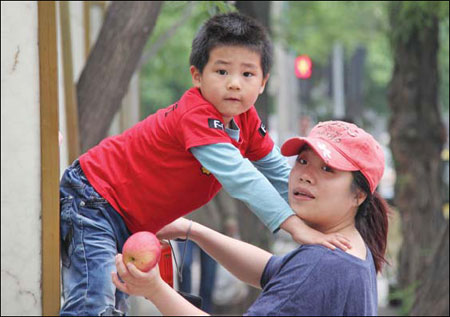Home sweet home
Updated: 2012-04-13 10:51
By Cheng Anqi (China Daily)
|
|||||||||||
Women are increasingly deciding to give up work and becoming full-time homemakers or mothers
An increasing number of urban women are choosing to be homemakers, rather than pursue careers.
About 40 percent of respondents to a poll of 20,000 women by the Internet company Tencent in 2010 said they wanted to be housewives, and a similar percentage indicated they wanted to work. The remainder expressed no preference.
 |
|
Stay-at-home mother Ling Li and her son at a Beijing park. [Provided to China Daily] |
Another survey, published in China Women's News in October, suggests 21 percent of mothers in first-tier cities were full-time mothers, 87 percent of whom had a college education, and 6 percent had graduate degrees.
When well-educated women climb the career ladder they suffer mounting pressure from their career, children and marriage, which can make them seek an alternative or easier lifestyle, said Jiang Yongping, a researcher at the Women's Studies Institute of China under the All-China Women's Federation.
During China's planned economy period from the 1950s the government provided nurseries at almost every State-owned work unit to help working mothers ease their burden, which created a stress-free environment.
After the market economy became dominant in the 1990s, State-owned enterprises shut their nurseries to reduce costs, which led to urban women opting to stay at home, Jiang said.
A survey by the Women's Studies Institute last year showed 99.9 percent of families across China take care of their own children aged under 3, and 60 percent of mothers look after these children all day long.
When children start kindergarten at 3, parents often arrive late for work or have to leave early to pick them up.
Liang Yuan, 27, is eight months pregnant and plans to quit her job after giving birth, as her salary in Shanghai as a media planner is about 4,000 yuan (483 euros), roughly the same as the cost of hiring a nanny.
"If we hire a skilled nanny, the price could be much higher," Liang said.
"Also, I don't trust them as there is so much negative news about them."
Liang's husband is 12 years older than her and a deputy director of an investment company, with an annual salary of about 1 million yuan.
As such she is free of financial pressure, but is still concerned about being a stay-at-home mother.
"I am afraid of becoming isolated from society and my social networks."
On the other hand, there are benefits in staying at home such as watching TV and making new friends, she said.
Liang said her female friends are envious of her for not working, but her parents have a different opinion.
"I'm afraid Liang is too young to leave work and it will be very hard for her to start again," her mother, Guo Yan, said. "I think she should be more independent and not totally rely on her husband."
Jiang said: "Many stay-at-home mothers hate to see their life become a dead-end and want to be sociable and broaden their horizons after years of housework and baby rearing."
But many cannot find jobs again because they need retraining.
Feng Juan, who graduated from Guangdong University of Foreign Studies eight years ago, worked in a minor support position at a telecom equipment company after marrying a diplomat and gradually scaled back her work when she was having a baby.
"My husband is sent to work abroad and I willingly accompany him, although I'm unemployed," said Feng, who takes care of her child and learns languages in her spare time.
"Women make these sacrifices voluntarily. For me, a successful family life is worth struggling for more than a successful career."
Her husband earns three times more than she does, she said. "But I control the purse strings," she added, smiling.
Ling Li, who has a master's degree from the University of the Arts London and is now a stay-at-home mother in Beijing, said: "Many professionals like me feel it's not worth sacrificing their careers for their husbands, but if it is for your kids, that's different."
Young mothers used to get their parents to look after their children when they went back to work.
"When I was born, my parents sent me to my grandparents' home until I was 8," said Ling, who stayed at home to ensure a better education for her child.
"Being away from my parents during that time had a negative impact on my personality. I don't want my child to have the same experience."
chenganqi@chinadaily.com.cn
Today's Top News
Rescuers race against time for quake victims
Telecom workers restore links
Coal mine blast kills 18 in Jilin
Intl scholarship puts China on the map
More bird flu patients discharged
Gold loses sheen, but still a safe bet
US 'turns blind eye to human rights'
Telecom workers restore links
Hot Topics
Lunar probe , China growth forecasts, Emission rules get tougher, China seen through 'colored lens', International board,
Editor's Picks

|

|

|

|

|

|





